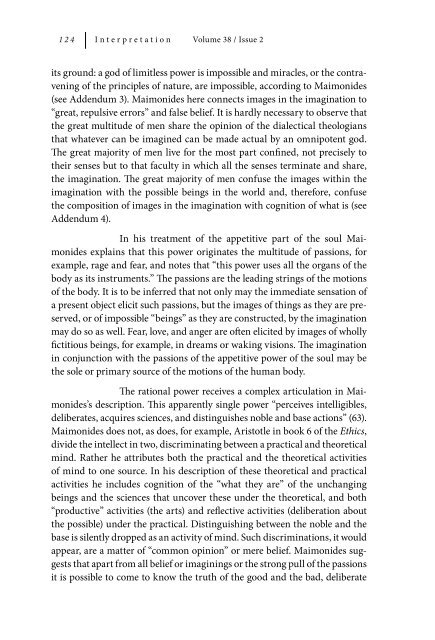105 119 147 171 177 197 - Interpretation: A Journal of Political ...
105 119 147 171 177 197 - Interpretation: A Journal of Political ...
105 119 147 171 177 197 - Interpretation: A Journal of Political ...
Create successful ePaper yourself
Turn your PDF publications into a flip-book with our unique Google optimized e-Paper software.
1 2 4 I n t e r p r e t a t i o n Volume 38 / Issue 2<br />
its ground: a god <strong>of</strong> limitless power is impossible and miracles, or the contravening<br />
<strong>of</strong> the principles <strong>of</strong> nature, are impossible, according to Maimonides<br />
(see Addendum 3). Maimonides here connects images in the imagination to<br />
“great, repulsive errors” and false belief. It is hardly necessary to observe that<br />
the great multitude <strong>of</strong> men share the opinion <strong>of</strong> the dialectical theologians<br />
that whatever can be imagined can be made actual by an omnipotent god.<br />
The great majority <strong>of</strong> men live for the most part confined, not precisely to<br />
their senses but to that faculty in which all the senses terminate and share,<br />
the imagination. The great majority <strong>of</strong> men confuse the images within the<br />
imagination with the possible beings in the world and, therefore, confuse<br />
the composition <strong>of</strong> images in the imagination with cognition <strong>of</strong> what is (see<br />
Addendum 4).<br />
In his treatment <strong>of</strong> the appetitive part <strong>of</strong> the soul Maimonides<br />
explains that this power originates the multitude <strong>of</strong> passions, for<br />
example, rage and fear, and notes that “this power uses all the organs <strong>of</strong> the<br />
body as its instruments.” The passions are the leading strings <strong>of</strong> the motions<br />
<strong>of</strong> the body. It is to be inferred that not only may the immediate sensation <strong>of</strong><br />
a present object elicit such passions, but the images <strong>of</strong> things as they are preserved,<br />
or <strong>of</strong> impossible “beings” as they are constructed, by the imagination<br />
may do so as well. Fear, love, and anger are <strong>of</strong>ten elicited by images <strong>of</strong> wholly<br />
fictitious beings, for example, in dreams or waking visions. The imagination<br />
in conjunction with the passions <strong>of</strong> the appetitive power <strong>of</strong> the soul may be<br />
the sole or primary source <strong>of</strong> the motions <strong>of</strong> the human body.<br />
The rational power receives a complex articulation in Maimonides’s<br />
description. This apparently single power “perceives intelligibles,<br />
deliberates, acquires sciences, and distinguishes noble and base actions” (63).<br />
Maimonides does not, as does, for example, Aristotle in book 6 <strong>of</strong> the Ethics,<br />
divide the intellect in two, discriminating between a practical and theoretical<br />
mind. Rather he attributes both the practical and the theoretical activities<br />
<strong>of</strong> mind to one source. In his description <strong>of</strong> these theoretical and practical<br />
activities he includes cognition <strong>of</strong> the “what they are” <strong>of</strong> the unchanging<br />
beings and the sciences that uncover these under the theoretical, and both<br />
“productive” activities (the arts) and reflective activities (deliberation about<br />
the possible) under the practical. Distinguishing between the noble and the<br />
base is silently dropped as an activity <strong>of</strong> mind. Such discriminations, it would<br />
appear, are a matter <strong>of</strong> “common opinion” or mere belief. Maimonides suggests<br />
that apart from all belief or imaginings or the strong pull <strong>of</strong> the passions<br />
it is possible to come to know the truth <strong>of</strong> the good and the bad, deliberate
















